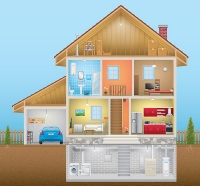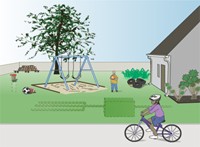Healthy Homes - Yard
Health and safety tips
- Watch for children playing on driveways.
- Direct rain water away from home using gutters and downspouts.
- Keep porches, stairs, walks and driveways in good repair and well lit.
- Use sunscreen and insect repellent.
- Make sure children always wear bicycle safety helmets when biking.
- Make sure playground surfaces are safe. Supervise children in play areas at all times.
- Keep children at a safe distance when mowing or using power tools.
- Remove sticks, stones and objects from the lawn before mowing.
- Make sure chainsaws have an anti-kickback device and a chain that is well sharpened.
- Wear proper eye and ear protection when using any power tool.
- Remove old tires and standing water that could allow mosquitoes to breed.
- Properly maintain septic tanks to prevent illness and backups.
- Remove litter, tall grass and brush to eliminate nesting areas for unwanted pests and to reduce insects and rodents.
- Use proper protective equipment when playing sports or riding bicycles.
- Avoid wood chip mulch near the house as termites eat wood.
- Keep landscaping plants off the house to reduce bugs and rodents.
Green tips
- Use trees and other plants to help shade your home if needed to help reduce cooling costs.
- Use windbreaks—trees and shrubs—around your home if needed to help reduce heating costs.
- Conserve water along with energy for a more sustainable landscape.
Raised bed gardening
Communities throughout the country are turning to gardening as a reasonable option to increase their access to healthy, nutritious and low-cost produce. Building raised beds and growing plants in containers is the most common way to reduce the chances of coming into contact with contaminants in urban gardens. Raised bed gardening is great where there is a limited space available for a garden. It helps to contain the area needed to grow vegetables. In addition, raised beds can help senior citizens and the disabled to participate in gardening activities. Raised beds are also one method suggested for urban gardening where contaminates soil is a concern. Click here for more information on Growing Gardens in Urbans Soils. Espanol
Pesticides
Pesticides can be beneficial when used in the proper amount and in the correct manner. Pesticides can be used to control:
- Mosquitoes and ticks that may transmit disease
- Bugs or rodents that damage agricultural crops
- Insects that damage homes and building structures
- Harmful bacteria, viruses or fungi
- Rodents that may transmit disease
- Weeds in yards and gardens
- Algae in pools or ponds
Overuse or misuse of pesticides can be very damaging to your health, wildlife or the environment. For example, many pesticides are poisonous if accidently ingested. Many pesticides can irritate the skin of people or pets. Some pesticides can cause harm to wildlife and the environment. Be sure to follow the directions on pesticide labels for safe use, storage, disposal and emergency medical treatment.
Do not dispose of your pesticides in your garbage. Do not pour leftover pesticides down the sink, into the toilet, down the sewer, in the street drain or in the yard. Follow the directions on the label for proper disposal. The Tennessee Department of Environment and Conservation’s Division of Solid and Hazardous Waste Management helps counties to collect household hazardous wastes for safe and proper disposal. Check with your local public works, environmental agency or health department to find out if your community has a household hazardous waste collection program for getting rid of unwanted, leftover pesticides.
There are many natural alternatives – both old and new – for helping to control pests. A classic natural alternative is cedar trees. Cedar wood is naturally insect resistant. Using cedar wood in your yard or closet will help to deter bugs. A newer example is pyrethrum. It is made from chrysanthemum flowers and is good in repelling insects. Boric acid powder is good against insects and spiders when put into cracks along floors and walls. Integrated Pest Management (IPM) is an environmentally sensitive and effective way to control pests without the use of synthetic chemicals.
Septic systems
If you live in an urban area or in the suburbs, when you flush your toilet, the waste travels through underground piping to the sanitary sewer system. The waste is treated at a water treatment plant. If you live in a rural areas, a treatment plant is not likely accessible. When you flush your toilet, the waste likely goes into a septic tank and eventually into a drain field in your yard. If not maintained, failing septic systems can contaminate groundwater and harm the environment by releasing bacteria, viruses and household hazardous waste to local waterways. Proper septic system maintenance protects public health and the environment and saves the homeowner money through avoided costly repairs.
The drain field delivers wastewater to the underlying soil. The soil acts as a filter to purify the wastewater before it reaches the groundwater or any adjacent surface waters. If you want to install a septic system at your home, you need a permit. Permits can be granted by the Tennessee Department of Environment and Conservation. Call 1-888-891-8332.
If you have a septic system, it must be properly maintained to prevent overloading and overflows. The general recommendation is to have your septic tank pumped out about every five years. If sewage backs up into your home, then you, your family, and pets should avoid contact with it. Clean up the mess when you have proper protection for your eyes, face, clothing and hands. The Centers for Disease Control and Prevention’s webpage on septic systems and the Environmental Protection Agency's SepticSmart webpage both offer a lot more information, including these simple tips for homeowners:
- Protect It and Inspect It: Homeowners should generally have their system inspected every three years by a qualified professional or according to their state or local health department's recommendations. Tanks should be pumped when necessary, typically every three to five years.
- Think at the Sink: Avoid pouring fats, grease and solids down the drain. These substances can clog a system’s pipes and drain field.
- Don’t Overload the Commode: Only put things in the drain or toilet that belong there. For example, coffee grounds, dental floss, disposable diapers and wipes, feminine hygiene products, cigarette butts and cat litter can all clog and potentially damage septic systems.
- Don’t Strain Your Drain: Be water efficient and spread out water use. Fix plumbing leaks and install faucet aerators and water-efficient products. Spread out laundry and dishwasher loads throughout the day: too much water at once can overload a system that hasn’t been pumped recently.
- Shield Your Field: Remind guests not to park or drive on a system’s drain field, where the vehicle’s weight could damage buried pipes or disrupt underground flow.
- NEVER flush prescription medicines down a toilet. For information on proper disposal of unwanted medicines, click here.

Additional resources
U.S. Department of Housing and Urban Development (HUD)
Help Yourself to a Healthy Home
nhl.gov/offices/lead/library/hhi/HYHH_Booklet.pdf
Tennessee Department of Environment and Conservation (TDEC)
Division of Water Pollution Control Septic System Construction Permit
www.tn.gov/environment/permit-permits/water-permits1/septic-systems-permits.html
U.S. Environmental Protection Agency (EPA)
Private Drinking Water Wells
water.epa.gov/drink/info/well/index.cfm
SepticSmart
www.epa.gov/septicsmart
Septic System Homeowner Guide
www3.epa.gov/npdes/pubs/homeowner_guide_long.pdf
U.S. Department of Energy (DOE)
Landscaping
www.energy.gov/energysaver/design/landscaping-energy-efficient-homes
